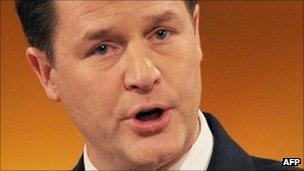Clegg warns Tory Eurosceptics over jobs
- Published

Nick Clegg said the UK should be trying to get the best out of the EU, not seeking to leave it
Deputy Prime Minister Nick Clegg has warned against rushing headlong down a cul-de-sac of arcane legal arguments about changes to EU treaties while growth and jobs in the UK are at stake.
He told the BBC it would be a "form of displacement activity from our national duty" to get the best out of the EU.
He added that three million Britons relied on Europe for their jobs.
Mr Clegg was responding to demands from Conservatives in the coalition for the repatriation of powers from Brussels.
Last week, 81 Conservative MPs defied the prime minister by backing a referendum on the UK's EU membership.
David Cameron has denied this showed the coalition was divided on whether any powers should be repatriated.
He has suggested that both he and Mr Clegg, whose Liberal Democrats are traditionally pro-European, agreed there should be some "rebalancing".
On Sunday, Mr Clegg wrote in the Observer, external that it would be "economic suicide" for Britain to "retreat to the margins" of Europe and a "sure-fire way to hurt British businesses and lose jobs".
'Turning inwards'
In a fresh warning to Tory Eurosceptics, Mr Clegg said: "People need to be careful what they wish for because if you wilfully move to the margins of Europe, before you know it, you will find it is hitting people where it hurts most.
"We shouldn't tie ourselves up in knots having arcane debates about article this or article that about a treaty which may or may not change when we have an urgent overriding national priority to promote jobs and growth.
"And we do that by being in the centre of the argument, not on the outer fringes of the argument," he told BBC Radio 4's Today programme.
"If instead we rush headlong down a cul-de-sac of increasingly arcane, legalistic arguments about changes to treaties that may or may not be open to renegotiation in the future, then I think that would be a form of displacement activity from our overriding national duty.
"We have got to get the best out of the European Union, not seek to get out of the European Union.
"The last thing we should do is betray our own history and our own traditions by turning inwards and isolating ourselves from the outside world."
He said he could argue for reform "every day of the week", insisting there was no need to wait for "some great treaty change".
He gave the example of getting a commitment from an assembly of trade ministers to reduce red tape and coming up with an agreement around patent protection.
- Published30 October 2011
- Published26 October 2011